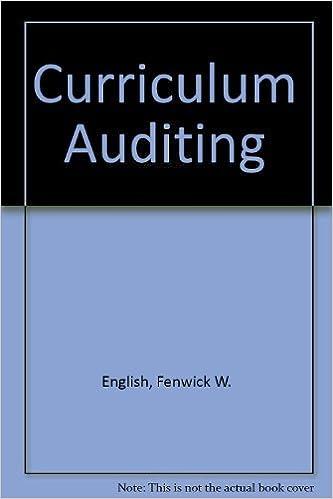Question
1. (TCOs 1, 2, 4, & 7) Caroline and Clint are married, have no dependents, and file a joint return in 2013. Use the following
1. (TCOs 1, 2, 4, & 7) Caroline and Clint are married, have no dependents, and file a joint return in 2013. Use the following selected data to calculate their federal income tax liability. AMTI $325,000 Regular income tax liability $61,001 AMT tax preferences $107,000
2. (TCOs 1, 3, & 10) In 2012, Walter had the following transactions:
| Salary | $80,000 |
| Capital loss from a stock investment | ($4,000) |
| Moving expense to change jobs | ($10,000) |
| Received repayment of $10,000 loan he made to his brother in 2007 (includes interest of $1,000) | $11,000 |
| Property taxes on personal residence | $2,000 |
Based on the information given above, determine Walter's AGI. Be sure to show your work
3. (TCOs 9 & 12) Tom, a calendar year taxpayer, filed his 2007 federal income tax return on April 1, 2008. In 2012, the IRS audits this return and assesses an income tax deficiency against Tom. On the grounds that the statute of limitations has run, Tom disputes the assessment. Is Tom correct? Why?
4.Joe is 50 years old, unmarried without children, and has earnings during 2012 of $8,000. He is not claimed as a dependent on another taxpayer's return. Does he qualify for the earned income credit? If so, calculate the amount of credit that is available to him.
5.A large municipality is considering the enactment of an ad valorem tax on personal jewelry. What, if any, problem would you anticipate with such a tax?
6. When a taxpayer disposes of a passive activity by gift, what happens to any unused passive losses?
7. In satisfying the support test and the gross income test for claiming a dependency exemption, a scholarship received by the person being claimed is handled the same way for each test. Do you agree or disagree with this statement? Why?
Rachel owns rental properties. When Rachel rents to a new tenant, she usually requires the tenant to pay an amount in addition to the first month's rent. The additional amount serves as security for damages to the property and the tenant's failure to pay future rents. How should the payments be characterized (e.g., on lease documents) to minimize Rachel's current tax liability?
Step by Step Solution
There are 3 Steps involved in it
Step: 1

Get Instant Access to Expert-Tailored Solutions
See step-by-step solutions with expert insights and AI powered tools for academic success
Step: 2

Step: 3

Ace Your Homework with AI
Get the answers you need in no time with our AI-driven, step-by-step assistance
Get Started


